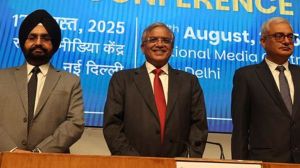Bommai puts Rs 95,000-cr price tag on compulsory education
NEW DELHI, November 7: The Ministry of Human Resource Development's grandiose plan to make elementary education a fundamental right has hit...

NEW DELHI, November 7: The Ministry of Human Resource Development’s grandiose plan to make elementary education a fundamental right has hit a wall.
A high-level committee set up to go into the costs of the proposal has come up with a mind-boggling figure of around Rs 95,000 crore, more than double the Ministry’s original estimate of Rs 40,000 crore to be spread over five years.
HRD Minister S R Bommai has suggested that the Finance Ministry and the Planning Commission examine the workability of his Ministry’s plan to mop up additional revenues by imposing an education cess, with a levy on corporate, excise and income taxes. While there are no two opinions that a concerted effort has to be made to enrol the nearly 50 million children who remain outside the school system, the HRD Ministry’s latest pipe-dream has drawn sharp attacks from educationists who view it as yet another costly gimmick that the country can ill-afford.
Bommai is merely putting into effect the United Front Government’s promise made in its Common Minimum Programme to make the right to free and compulsory education up to the age of 14 years a fundamental right.
Since then the Ministry has looked at the proposal from every angle: Academic, legal, administrative, financial. And at every turn, the grand scheme appears to have hit trouble.
Some educationists say that in the existing climate of political apathy, this too would end up as yet another failed scheme unless State Governments are goaded into implementing the scheme. Others feel the plan amounts to “mere tokenism” and instead the Mini ster should stick to implementing the hundred and one education schemes that already exist. With nearly 30 per cent of funds earmarked for several education schemes going underutilised, implementation should be the key word, educationists point out.
The problem of funds apart, the verdict of educationists across the board is that the scheme is just not workable. Experts at the National Institute of Education Planning and Administration (NIEPA) say the principal failing of the proposal is that the Ministry has failed to work out the nitty-gritty of its implementation. “Who is going to be held responsible for the implementation of the scheme? Will you send parents to jail?,” says Prof N V Varghese of the NIEPA. Other experts raise a host of unanswered questions about the move, including the monitoring mechanism to keep track of the scheme. What about child labourers? How are they to be compensated for the time they spend in school? How does one ensure that State governments enforce the law? There are too many imponderables — all of which indicate that even if the funds were made available, the plan would not be workable.
Educationist and former Dean of the Faculty of Education at Delhi University Prof Suresh Shukla says unless the operational machinery was geared to implement the scheme, such legislation would amount to mere tokenism. “It sounds extremely impressive at international seminars or at presentations for UNESCO. But it makes no difference on the ground,” he says. The problem with the education cess is that there are no guarantees that the funds so collected will be used for providing elementary education. Though the constitutional commitment that comes from making elementary education a fundamental right is being viewed as a positive step, the lack of details about the implementation of the law raises a number of doubts. “Whether education is made a fundamental right or remains in the directive principles is not going to change the situation”, says Varghese.





- 01
- 02
- 03
- 04
- 05


























